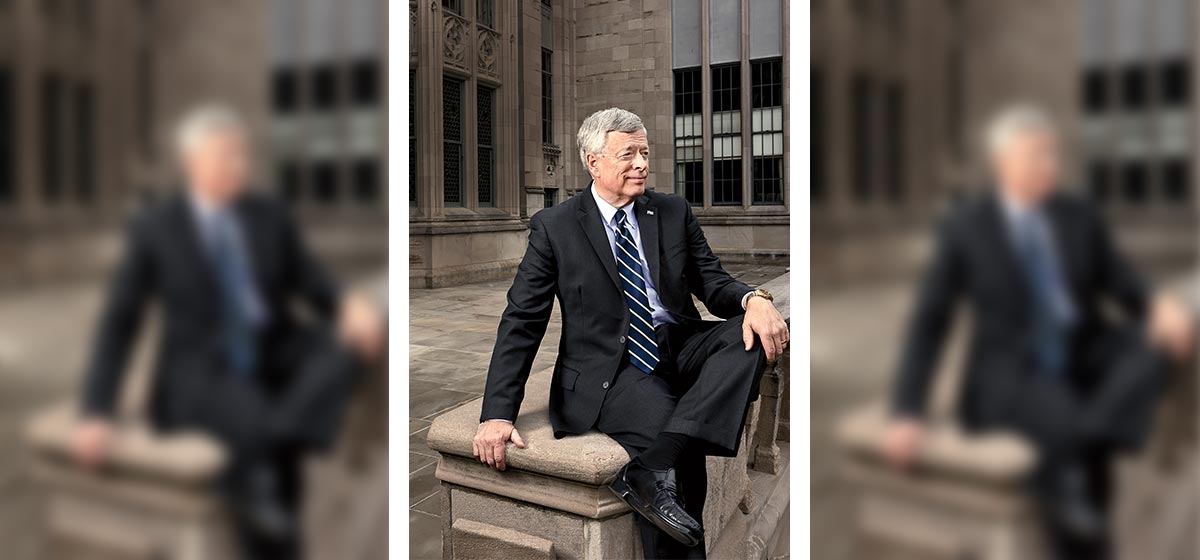Consensus Builder

Mark Nordenberg’s cell phone lights up. He smiles to see a call from Herb Douglas, the oldest living African-American Olympic medalist and a University of Pittsburgh alum. Douglas hails from Pittsburgh’s Hazelwood neighborhood, where some community advocates raise questions about how residents will fare amidst the mammoth Hazelwood Green development project currently under construction. “Are they going to be displaced?” Nordenberg wonders. “Or is there some way in which they will benefit from what could be a huge project? Because it’s a big piece of land, it sits right on the river, and it’s close to the universities.”
The summer sun strikes his face through his office window on the sixth floor of Pitt’s Cathedral of Learning, where Nordenberg has carved out a new calling since stepping down as the university’s chancellor in 2014. He’s no longer managing 14,000 employees and worrying about budgets, endowments and campus plans. Now, he’s tackling workforce development, the opioid epidemic and incarceration reform through Pitt’s Institute of Politics (IOP), which has served the region’s civic leaders for almost three decades, providing non-partisan forums for policy-making. Nordenberg remembers first meeting his IOP team as their chair, a position he assumed in 2015. “The entire staff was gathered around the table, and it was about six people including an intern. And I said to myself, ‘Well, I guess this is going to be a little bit different than leading the university.’ ”
It has been. He’s able to focus on southwestern Pennsylvania’s most pressing problems that “you can never invest enough time in… there’s always something more you could do to make a difference, so it’s a demanding role but in a positive way.” Most of his IOP colleagues are younger, pushing him to consider issues from other angles—“we kind of energize each other.”
Opportunity and responsibility
From his office perch overlooking the city, wearing a blue button-down and gray slacks, Nordenberg says he’s heartened by the region’s readiness to make “positive social changes” impacting the quality of life for many, citing the “strong working relationship” and “shared set of values” between Allegheny County Executive Rich Fitzgerald and Pittsburgh Mayor Bill Peduto that allow them to collaborate smoothly on projects. Biomedical research, robotics, health care—these are some of the foundations for the local economy, but it’s crucial to ensure they remain in the long run and that everyone profits from their progress. He cites African Americans as a group that has not “experienced the benefits of a robust economy,” adding that “efforts like retraining only provide a partial cure,” and that as the economy changes “blue-collar workers of all races including whites” now “feel like they’ve been left behind. … and it’s going to be difficult for them to recover.”
Technological innovation carries both opportunity and responsibility. “Autonomous vehicles are a perfect example,” Nordenberg says, “because there is the potential there to do great good; on the other hand, there is the potential to eliminate a lot of jobs, some of which are really the rough equivalent of steelworker jobs back when they were a way that a worker could support a middle-class lifestyle for a family.” He discusses labor costs, recalling walking a quarter of a mile through a South Korean steel plant and spotting only three employees, adding that the popular images from Pittsburgh’s steel heyday of “thousands of workers filing into these big plants just don’t seem to exist anymore.”
It’s not just about throwing cash at the problem, he says, referencing Annie Lowrey’s book “Give People Money,” which advocates for a universal basic income. It’s also about self-worth, how “the returns from work, for a lot of people at least, go beyond the economic returns.” He acknowledges the tension between earning a diploma and acquiring job skills, but says laborers need to have “breadth to their education” that allows them to adapt to technological shifts. Some skills may be “translatable,” but a grounding in education “would make a person a better candidate for meaningful job retraining at some later point in his or her life.” In September the IOP gathered elected officials together to discuss work and the American dream in a two-day retreat: “Democracy in America: Responding to Challenges and Change in Government, Society, and Work.”
A light touch
In his office, he’s surrounded by traces of his transformative 19-year tenure as Pitt’s chancellor—photos of him with Desmond Tutu and Nelson Mandela, signed footballs and basketballs, framed thank-you notes, all testifying to how he’s helped revitalize the university and Pittsburgh. While his responsibilities have changed, Nordenberg points out, he’s still striving to improve the region with many of the same people he knew as the university’s top executive, leveraging long-term relationships as well as the IOP’s resources to chair ventures such as Pitt’s Opioid Abuse Prevention and Recovery Task Force in 2018. The report, convened by Pitt’s Provost’s Office, is one of the first of its kind to focus on the opioid epidemic on college campuses. Leaning forward in his chair, Nordenberg rattles off his accomplished crew: “I’ve got the academic head of addiction medicine. I’ve got somebody who has led a sector dealing with prevention for years. I’ve got the leader of the center that is home to both OverdoseFreePA and the Pennsylvania Opioid Overdose Reduction Technical Assistance Center. And then I’ve got a mother, and I’ve got students, and I’ve got the people who lead the student life efforts here, who lead the student health clinic, and David Hickton, the former U.S. attorney.”
Hickton, founding director of Pitt’s Institute for Cyber Law, Policy, and Security and co-chair of the National Heroin Task Force says that Nordenberg’s “touch is very light but his leadership is very strong at the same time,” which allowed him to effectively guide the group without dominating discourse. Some participants wanted to broaden the study to examine campus substance abuse, but Nordenberg kept everyone focused on opioids. The former chancellor remembers: “There were people who said, ‘We’ve got to look at the big picture here’ and I said, ‘If we look at the big picture we’re never going to get done. Other people have looked at the big picture, others have not taken this approach, so trust me. This is what we’re going to do.’ ”
His vision impressed Christine Henney, who lost her son R.J., a Pitt student, to an opioid overdose in 2016. She and Nordenberg had met through her work for BNY Mellon (Nordenberg sits on the bank’s board). He’d told her about his endeavors with the opioid crisis. She’d told him about R.J. He invited her to serve on the task force and made her feel welcome amidst the constellation of experts. And when the committee formally presented its findings, Nordenberg purposefully sat back from the table so that Henney could voice her thoughts. He was “almost like a father, right? Just kind of let that bud go, and see what happens,” she recalls. “Let that youngster ride their bike, stop the training wheels and see how it goes. … he was basically letting the committee acknowledge our own contributions.” Henney, an alum of Pitt’s Katz Graduate School of Business, admits she’d never previously felt connected to the university—but that all changed when Nordenberg tapped her for the task force.
Beyond a report
Getting key stakeholders involved throughout an IOP report process is important, because if they haven’t been able to “engage in this kind of back and forth and to see where it takes you,” Nordenberg explains, they may not fully embrace a report’s findings. It’s one reason the institute has shifted from just rolling out white papers to rolling up its sleeves and implementing ideas. He mentions the 40-person criminal justice task force that he co-chaired with Frederick W. Thieman, former U.S. Attorney and past Buhl Foundation CEO who now serves as its Henry Buhl, Jr. Chair for Civic Leadership.
Several years ago, at Nordenberg’s behest, Thieman spoke at an IOP retreat about criminal justice in the 21st century, and his perspectives intrigued Allegheny County Executive Rich Fitzgerald. Fitzgerald then commissioned the institute in 2015 to help the county think through a fairer and more efficient jail system, which has accounted for nearly 42 percent of its overall budget according to the 2016 IOP report. Who’s being jailed, and for what reason? How to cut costs while safeguarding public safety?
Today, a progress panel helmed by Thieman and Nordenberg continues to monitor the implementation of the report’s recommendations, which already are changing how the county does justice. A Pitt psychiatry professor now acts as a criminal justice coordinator, breaking down silos in the system that prevent stakeholders from talking to each other. Public defenders now represent more people at preliminary arraignment through a pilot program, which has lowered use of cash bail by 19 percent and jail bookings by 18 percent. Enhanced communication systems now provide real-time data on jail use. Magistrates can utilize a new risk assessment tool that recommends the most equitable pretrial disposition for defendants. And Allegheny County District Attorney Stephen A. Zappala Jr. has begun to exercise more oversight over charging patterns. The MacArthur Foundation, which awarded the county $2 million in October to recognize and support its reforms, has asked the IOP to share a webinar on how to convert these notions into action so that policymakers nationwide can rethink incarceration.
Jail use is a topic that triggers, in Thieman’s words, visceral public responses “ranging from ‘lock ’em up’ to ‘hug them.’ ” So why tackle it? Nordenberg says he’s an opportunist, “I haven’t mapped this out.” Along with a fear of failure, he’s driven to do his best at whatever comes his way. He says his response is “ ‘Yes’ a high percentage of the time which means that all of a sudden I have these responsibilities that I’ve agreed to shoulder, and I need to work hard to discharge them.”
Thieman thinks his co-chair doesn’t rest on his laurels as one of Pittsburgh’s changemakers because he acts from the heart. “He cares deeply about the racial inequalities that continue to hold the region back. It would probably be hard to find two systems other than education and the criminal justice system which have provided both barriers for minorities but also hold the potential to be turned around. … Since he has a megaphone, he’s chosen to use that to bring a voice to people who don’t traditionally have a voice.”
Allegheny County Manager William McKain marvels at Nordenberg’s knack for opening up dialogue: “He goes and talks to the judges, he talks to the public defender, he talks to the jail, he talks to law enforcement, he talks to the district justices, he talks to representatives from the district attorney’s office, talks to me, talks to the county executive. … Mark touches all the bases because he knows that being inclusive is the best way to bring progress.”
Choosing his words
Nordenberg is concerned about the nation’s current manner of conversing and how people with differing views speak to each other. “If you can’t agree on facts, then you can’t have much of a discussion of problems,” he says. A “child of Sputnik,” and a math major, he adds that “there are some things that are not provable, but there are a lot of things that are provable and the failure to accept that, I think, is a really perilous path.” His law training taught him how to disagree “without being disagreeable,” and that you “diminish yourself by belittling others.” But he bemoans the erosion of these norms today and how demonization threatens constructive partnership. It’s why he’d rather recount how two former county execs, Republican Jim Roddey and Democrat Dan Onorato, co-chaired an IOP effort to support financially distressed municipalities, or how Republican state Rep. Dave Reed teamed with Democratic state Rep. Dan Frankel to steer an IOP study on poverty. “I do feel that there may be ways in which we can set an example for other regions, too, if we can keep this tradition of working together alive.”
Nordenberg chooses his words slowly, with care. Thieman recalls how this method of speaking first jarred him, making him wonder whether his colleague really knew his own mind. But he realized Nordenberg knows exactly what he wants to express, measuring sentences for impact. “I think it’s really been the key to his success,” Thieman observes, “because it’s a style that he communicates on an interpersonal, one-to-one level, but it’s also a style that can translate to large groups.”
After an interview, Nordenberg strides out of the Cathedral of Learning and up Tennyson Avenue, leather satchel tucked under one arm. He is headed towards the home he shares with his wife Nikki Pirillo Nordenberg, where a grandson awaits his return so that they can drive to watch “Hotel Transylvania 3” in a theater. Climbing the hill, shadowed by trees, he walks the way he talks—steadily, deliberately, ready to meet the next person who needs him.






